The
Development of an African-American Musical Theatre 1890-1910
1890-1900
 In
the early 1890s, the traditional minstrel format began to change, as elements
of vaudeville began to be incorporated. Women appeared as featured performers
and were often elegantly costumed and attractively presented. The Creole
Show was the first of this type to be presented, touring from 1890 to
1897; Sam Lucas was involved in its early years. Later performers included
the cakewalk dancers Charles Johnson and Dora Dean; Ernest Hogan appeared
for many years with the show.
In
the early 1890s, the traditional minstrel format began to change, as elements
of vaudeville began to be incorporated. Women appeared as featured performers
and were often elegantly costumed and attractively presented. The Creole
Show was the first of this type to be presented, touring from 1890 to
1897; Sam Lucas was involved in its early years. Later performers included
the cakewalk dancers Charles Johnson and Dora Dean; Ernest Hogan appeared
for many years with the show.
photo
caption:
Dora Dean and Charles Johnson
Detail from "Coon,
Coon, Coon." 1899.
The
Creole Burlesque Show (1890-1897)
Johnson
and Dean
I
Want to Play Hamlet
At
about the same time, the concert singer M. Sissieretta Jones, known as "Black
Patti" began to tour with a variety company called the Black Patti Troubadours.
Their performances incorporated Jones' operatic repertoire as well as vaudeville
episodes performed by the company. Bob Cole, one of the central figures in
the development of the African-American musical stage, was associated with
this troupe for a time in its early years. John Larkins wrote and appeared
in the musical A Royal Coon, presented as part of the Black Patti
Troubadours show in 1909. The troupe toured from 1896 to 1915.
Black
Patti Troubadours (1896-1915)
A
Royal Coon
In
1898, Bob Cole and Billy Johnson presented A Trip to Coontown, the
show that has been called "a landmark musical in the history of black theatre."
(Peterson: A Century of Musicals in Black and White). This show, which toured
for several years, clearly left behind the minstrel format, and was also notable
in that it was conceived, written, produced, and performed by African Americans.
A
Trip to Coontown (1898)
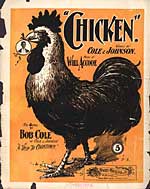 Chicken
Chicken
Luckiest
Coon in Town
Wedding
of the Chinee and the Coon
photo
caption:
Chicken
1899
The
same year, the African-American composer Will Marion Cook presented Clorindy,
or The Origin of the Cakewalk, with lyrics by the poet Paul Laurence
Dunbar. It opened with an all-black cast at the Casino Roof Garden theatre,
and was a great success. It starred the popular minstrel comedian Ernest Hogan
and saw the debut of singer Abbie Mitchell (later Mrs. Cook).
Clorindy,
or, The Origin of the Cakewalk (1898)
Darktown
is Out Tonight
Who
Dat Say Chicken in Dis Crowd
In
1899, the legendary team of Bert Williams and George Walker, along with Jesse
A. Shipp, produced The Policy Players in New York, the first of the
team's popular musicals that showcased African-American performers, composers,
and librettists. Aida Overton Walker (shortly before her marriage to George
Walker) appeared in the cast.
The
Policy Players (1899)
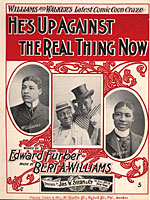 He's
Up Against the Real Thing Now
He's
Up Against the Real Thing Now
I
Don't Like No Cheap Man
Why
Don't You Get a Lady of Your Own
photo
caption:
Williams and Walker
"He's
up against the real thing now."
Words by Edward Furber;
Music by Bert A. Williams.1898.
1900-1910
The
turn of the century saw a new effort from Williams and Walker, with music
by Will Marion Cook and lyrics by Alex Rogers, Sons of Ham. Many other
well-known African-American musicians and librettists contributed to the score,
including Will Accooe, Cecil Mack, Bob Cole, J. Rosamund Johnson, James Weldon
Johnson, and Tom Lemonier.
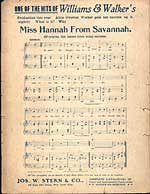 Sons
of Ham (1900)
Sons
of Ham (1900)
Hannah
from Savannah
My
Little Zulu Babe
Phrenologist
Coon
photo
caption:
Hannah
from Savannah, 1902
The
same year, The Belle of Bridgeport, described as a "white-oriented
musical farce" by Peterson,
with music and lyrics by Bob Cole, James Weldon Johnson, and J. Rosamond Johnson,
and starring May Irwin, opened in New York. Cole and J. R. Johnson were prolific
and popular songwriters for the white musical stage in addition to producing
their own shows.
The
Belle of Bridgeport (1900)
Louisiana
Lize
In
1902, perhaps the best-known of the turn of the century African-American musicals,
In Dahomey, was produced. Jesse A. Shipp wrote the book, and Paul Laurence
Dunbar wrote lyrics. One of a number of "back to Africa" musicals, it was
another effort of the team of Williams and Walker. Many other well-known African-American
composers and lyricists contributed to the show (which changed significantly
during its four-year run and tour), including James Weldon Johnson, J. Leubrie
Hill, Al. Johns, Alex Rogers, and James Vaughan.
In
Dahomey (1902)
Evah
Dahkey is a King
I'd
Like to be a Real Lady
I'm
a Jonah Man
On
Emancipation Day
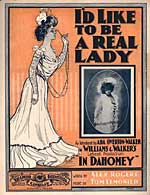 Molly
Green
Molly
Green
(Historic American Sheet Music)
When
Sousa Comes to Coon Town
(Historic American Sheet Music)
Why
Adam Sinned (interpolated)
photo
caption:
I'd
Like to be a Real Lady, 1902
In
1904, Will Marion Cook (under the name Will Mercer) wrote The Southerners,
which featured a black and white cast, most unusual for its day. The African-American
performers had musical parts rather than speaking roles, and the cast included
Abbie Mitchell.
The
Southerners (1904)
Good
Evenin
Mandy
Lou
Williams and Walker's next effort was Abyssinia, in 1906. It featured
music by Will Marion Cook and Bert Williams, and the book and lyrics were
by Jesse A. Shipp and Alex Rogers, and is another in their series of "African"
musicals.
Abyssinia
(1906)
I
Thought My Troubles Were Over
(Historic American Sheet Music)
I'll
Keep a Warm Spot in My Heart for You
(Historic American Sheet Music)
Let
It Alone
(Historic American Sheet Music)
In 1907, Cole and Johnson produced a musical notable for its subject matter.
The Shoo-Fly Regiment concerned African-American soldiers in the Spanish-American
war, and avoided the minstrel stereotyping and caricaturings still expected
in the musical comedy stage. The play also included a romantic element treated
seriously, rather than comically, another departure for the time.
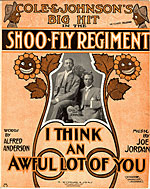 The
Shoo-Fly Regiment (1907)
The
Shoo-Fly Regiment (1907)
I
Think An Awful Lot of You
(Historic American Sheet Music)
Sugar
Babe
(Historic American Sheet Music)
Won't
You Be My Little Brown Bear?
(Historic American Sheet Music)
photo
caption:
I
Think An Awful Lot of You, 1907
Williams
and Walker's last musical together was the 1908 Bandana Land; Walker
fell ill in 1909 and died in 1911. Williams went on to star in the Ziegfeld
Follies for many years, and was the only African-American performer to appear
in the show until many years later. Bandana Land was a departure from
the usual "back to Africa" formula, in that it was set in the United States.
The cast included Aida Overton Walser, Alex Rogers, and J. Leubrie Hill in
addition to Williams and Walker. Many well-known African composers contributed
to the score, including Chris Smith, Cecil Mack, and Tom Lemonier.
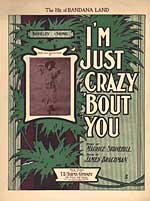 Bandana
Land (1908)
Bandana
Land (1908)
Bon
Bon Buddy
Bon
Bon Buddy: The Chocolate Drop
Exhortation
I'm
Just Crazy About You
Just
the Same
Kinky
You're
in the Right Church but the Wrong Pew
I'd
Rather Have Nothin' All of the Time Than Somethin' for a Little While
(Historic American Sheet Music)
Somebody
Lied
(Historic American Sheet Music)
Advertisements
for Bandanaland
photo
caption:
I'm
Just Crazy About You,
1908
Cole
and Johnson's 1909 The Red Moon is noteworthy in that it involved characters
of both African Americans and Native Americans. Like The Shoo-Fly Regiment,
The Red Moon moved away from stereotypical conventions, and included a
serious romantic theme. The bandleader James Reese Europe contributed songs
to the show, which included in its cast Abbie Mitchell, Aida Overton Walker,
and Sam Lucas.
The
Red Moon (1909)
Pliney
Come Out in the Moonlight
After
1910, the African-American musical stage, so lively and brilliant for a few
short years, suffered a declinethat lasted about a decade. Many of the key
players had died: notably, George Walker, Bob Cole, and Ernest Hogan were
gone from the scene. Bert Williams joined the Ziegfeld Follies, where he starred
for many years.
However,
during this time, African-American composers continued to make significant
contributions to the musical theatre and to popular music in general. Ragtime
songs were followed by the beginnings of jazz and blues, paving the way for
the resurgence of the stage in the 1920s, with the work of Sissle and Blake,
Creamer and Layton, Maceo Pinkard, and others.
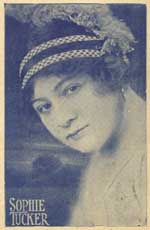 Shelton
Brooks:
Shelton
Brooks:
The
Darktown Strutters Ball
photo
caption:
The
Darktown Strutters Ball
Words and music by Shelton Brooks. 1917.
W.
C. Handy:
St.
Louis Blues
James
Reese Europe:
Goodnight
Angeline
Henry
Creamer and Turner Layton:
Everybody's
Crazy 'bout the Doggone Blues (Sung by Bert Williams in the Ziegfeld Follies)
Perry
Bradford:
Fare-Thee
Honey Blues
Eubie
Blake:
Mammy's
Lit'l Choc'late Cullud Chile
Maceo
Pinkard:
Don't
Cry, Little Girl, Don't Cry
[Back]
Copyrighted
2001, United States
of America
Anita Gonzalez & Ian Granick
 In
the early 1890s, the traditional minstrel format began to change, as elements
of vaudeville began to be incorporated. Women appeared as featured performers
and were often elegantly costumed and attractively presented. The Creole
Show was the first of this type to be presented, touring from 1890 to
1897; Sam Lucas was involved in its early years. Later performers included
the cakewalk dancers Charles Johnson and Dora Dean; Ernest Hogan appeared
for many years with the show.
In
the early 1890s, the traditional minstrel format began to change, as elements
of vaudeville began to be incorporated. Women appeared as featured performers
and were often elegantly costumed and attractively presented. The Creole
Show was the first of this type to be presented, touring from 1890 to
1897; Sam Lucas was involved in its early years. Later performers included
the cakewalk dancers Charles Johnson and Dora Dean; Ernest Hogan appeared
for many years with the show. Chicken
Chicken He's
Up Against the Real Thing Now
He's
Up Against the Real Thing Now Sons
of Ham (1900)
Sons
of Ham (1900)  Molly
Green
Molly
Green  The
Shoo-Fly Regiment (1907)
The
Shoo-Fly Regiment (1907)  Bandana
Land (1908)
Bandana
Land (1908)  Shelton
Brooks:
Shelton
Brooks: